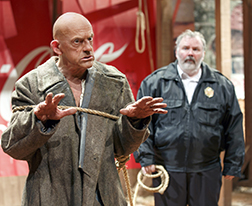By Lucy Komisar
Bertolt Brecht‘s 1944 play with music – almost a chamber opera – is a satiric parody about selflessness and greed. As the narrator puts it, “Terrible is the temptation to do good.” Classic Stage director Brian Kulick helms a strong production laced with Brecht‘s irony, colored by caricatures and driven by strong performances. He has edited the text, but he remains true to the author’s conception. Kulick starts the play at the turn of the last century and ends with the collapse of Soviet communism.

The production begins as a play within a play, actors struggling against continual blackouts that leave them in darkness. It’s an apt metaphor. This is a time of upheaval in early 1900s Georgia. Revolutionary paintings are on the wall. There‘s a statue of Lenin. The governor has been killed and the grand duke overthrown in a coup by the prince.
Grusha (Elizabeth A. Davis), the young kitchen maid at the governor‘s house, is the good soul to whom everything terrible happens. The governor‘s wife (the incomparable Mary Testa), abandons her baby as she organizes her wardrobe for the flight to safety.

Grusha rescues the infant and then flees, as the Ironshirts — soldiers meant to resemble Nazi storm troopers — pursue the child who is perceived as a threatening heir. She leaves in spite of the danger that she will not again find her soldier sweetheart.
Davis encompasses the girl‘s innocence, but she is too mild for the role. She is overpowered by others in the cast.
The scowling village clerk Azdak (a very idiosyncratic, dominating Christopher Lloyd) shelters a fugitive whose white hands show him a landowner. Lloyd is the ballast of the production. Azdal later realizes the beggar is the duke. However, he is charged with stealing the prince’s rabbit. He declares, I am despicable, treacherous, branded! Tell them, flatfoot, how I insisted on being put in chains and brought to the capital. Because I sheltered the Grand Duke, the Grand Swindler, by mistake. But when he accuses himself, everyone laughs.
Power shifts, and Azdak is put in a position of authority. It‘s a new age, maybe. Azdak, who in some respects speaks for Brecht, declares, “Everything is being investigated, brought into the open. In which case a man prefers to give himself up. Why? Because he won‘t escape the mob.” He says, “Judgment must always be passed with complete solemnity”because it‘s such rot.

Suppose a Judge throws a woman into the clink for having stolen a loaf of bread for her child. And he isn‘t wearing his robes. Or he‘s scratching himself while passing sentence so that more than a third of his body is exposed”in which case he‘d have to scratch his thigh”then the sentence he passes is a disgrace and the law is violated.”
The play is also a satire and critique of the military. It could take place today. The prince wants to make his nephew the judge, but requires the Ironshirts’ support, so Azdak plays the duke in a mock trial. The prince‘s nephew declares to Azdak, ”You‘re being accused, not of declaring war, which every ruler has to do once in a while, but of conducting it badly.”
THE NEPHEW
It‘s not your business to command me. So you claim the Princes forced you to declare war. Then how can you claim they made a mess of it?
AZDAK
Didn‘t send enough troops. Embezzled funds. During attack found drunk in whorehouse.
THE NEPHEW
Are you making the outrageous claim that the Princes of this country did not fight?
AZDAK
No. Princes fought. Fought for war contracts….Princes have won their war. Got themselves paid 3,863,000 piastres for horses not delivered…. 8,240,000 piastres for food supplies not produced…. And therefore victors. War lost only for Grusinia, which is not present in this court.”
The Ironshirts like Azdak and make him the judge. And the bribes continue. It‘s so much a part of the job of a judge that he seems destined to grab for the cash. He has to adjudicate an absurd dispute over the theft of a cow and a ham. Of course, injustice ensues. That doesn’t last long. The Ironshirts decide that Azdak is an enemy of the state.
Meanwhile, Gursha carries the child across a rickety bridge and into a snowy village where she desperately seeks shelter, meeting mean welcomes even from relatives.
At the end, Brecht presents the parable of the chalk circle which is just a variant of the Judgment of Solomon. Grusha and the governor‘s wife, who both want the boy, are ordered by the judge to each take an arm and pull the child (an entrancing puppet) over opposite sides of a chalk circle.

Brecht‘s play is a political cartoon, and director Kulick draws it expertly. The shift to the fall of the Soviet Union occurs so seamlessly, that you can‘t tell it except for the Coca Cola sign. The actors are a fine ensemble, especially Testa as the governor‘s loud-mouthed wife. This Classic Stage revival shows again why the Company is so important to New York.
“The Caucasian Chalk Circle.” Written by Bertolt Brecht, translated by James and Tania Stern, Lyrics by W.H. Auden, new music by Duncan Sheik, directed by Brian Kulick. Classic Stage Company, 136 East 13th Street, New York City. (212) 677-4210 x10. $40 General Rush and $20 Student Rush, one ticket per person, at Box Office starting 1 hour before curtain. Opened May 30th 2013, closes June 23, 2013. Review on NY Theatre Wire. 5/31/13.



Pingback: Caucasian Chalk Circle Research Board – Brittany Rupp's Journal